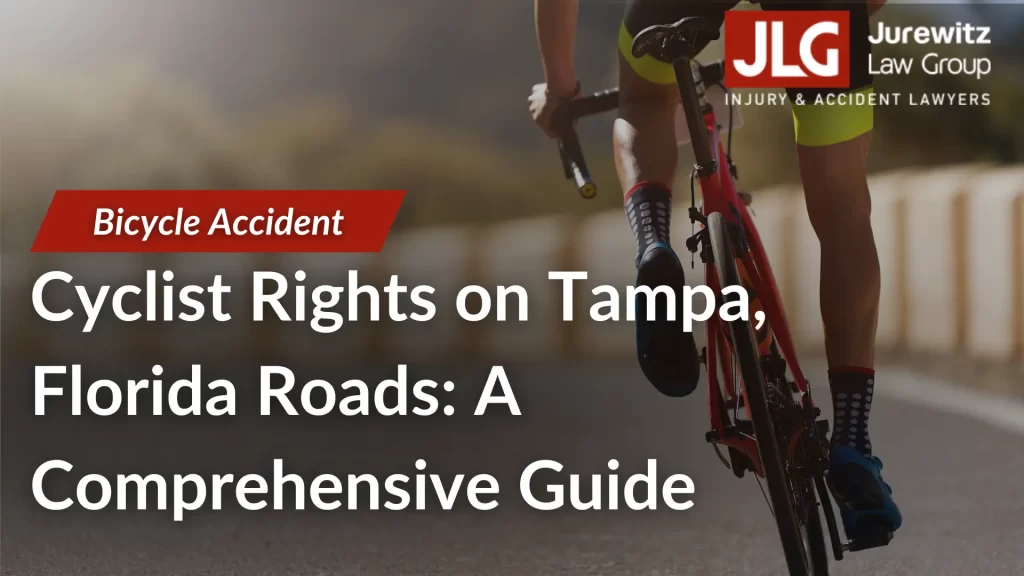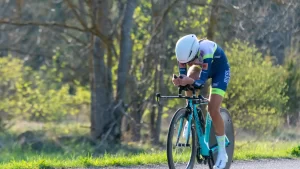
As Floridians search for ways to keep healthy, save money at the gas pump, and reduce their carbon footprint, cycling has become increasingly popular. However, Florida consistently has one of the highest rates of fatal bicycle accidents across the country. Understanding bicycle and cyclist safety and rights is crucial. The seasoned bicycle accident team at Jurewitz Law Group Injury & Accident Lawyers has put together this bicycle legal guide to help keep Florida cyclists safe.
Where Can Bicyclists Ride?
One of the most crucial things to know as a cyclist is where Florida bicycle laws permit you to ride.
Streets
Under Florida cycling road laws, bicycles are considered vehicles. As such, they have as much a right to the road as cars, trucks, and motorcycles. When cyclists are in the street, other road users must follow the “three-foot law.” This rule states that drivers must give cyclists at least three feet of space when passing. Motorists who cause accidents by failing to follow this rule can be held liable for resulting injuries and losses.
When riding in streets, cyclists are subject to the same speed limits as other vehicles. However, it is worth considering that the posted speed limit might not always be safe for cyclists. When traveling below the speed limit, you should keep your bike as far to the right as possible. This allows other vehicles to pass you safely.
Sidewalks
The legality of riding a bicycle on a sidewalk is a topic of heated debate among cyclists and pedestrians alike. In general, Florida bicycle laws permit cyclists to ride on the sidewalk. This is true as long as they do so safely and consider others. However, each local government has its ordinances governing exceptions to this general rule.
Tampa Municipal Code section 25-185 prohibits cyclists from riding their bikes on sidewalks in a business district. Furthermore, cycling on a sidewalk is banned anywhere a posted sign prohibits it. When bicycles are allowed on sidewalks, cyclists must yield the right of way to pedestrians. They must also give an audible signal before passing others on the sidewalk.
Bike Lanes
Some areas of Tampa offer bike lanes. While cyclists are not generally required to use these lanes, it is often safer to travel in a bike lane. This is in contrast to riding on a busy sidewalk or a street with a high-speed limit. Furthermore, riding in a bike lane can help protect cyclists from being injured in “dooring” accidents.
Highways
Florida bicycle laws do not permit cyclists to ride on highways or interstates.
Florida Bicyclist Safety Requirements
To ensure the safety of cyclists on Tampa roads, Florida bicycle laws impose certain safety measures. First and foremost, cyclists under the age of 16 must wear a helmet that meets federal safety standards. Although helmets are not mandatory, wearing one can significantly reduce the risk of severe head injuries in the event of an accident.
When cycling between the hours of sunset and sunrise, bicycles must be equipped with a white light. This must be on the front and visible from at least 500 feet. Also, a red reflector on the rear, visible from 600 feet, should be installed. Additionally, cyclists should wear reflective clothing or use reflective tape on their bicycles to increase their visibility to other road users.
Cyclists are required to use hand signals when turning or stopping. This helps communicate their intentions to motorists and other cyclists, reducing the risk of collisions. Bicyclists must also refrain from wearing headphones or earbuds while riding, as this can impair their ability to hear approaching vehicles or other hazards.
Proving Fault in a Tampa, Florida, Bicycle Accident
 In the event of a bicycle accident, proving fault is crucial for cyclists seeking compensation for their injuries and losses. Florida bicycle laws operate under a comparative negligence system, meaning that fault can be shared between parties involved in an accident., To prove fault, cyclists must demonstrate that the other party (usually a motorist) acted negligently or recklessly, leading to the accident.
In the event of a bicycle accident, proving fault is crucial for cyclists seeking compensation for their injuries and losses. Florida bicycle laws operate under a comparative negligence system, meaning that fault can be shared between parties involved in an accident., To prove fault, cyclists must demonstrate that the other party (usually a motorist) acted negligently or recklessly, leading to the accident.
Evidence that can help prove fault in a bicycle accident includes:
- Police reports
- Witness statements
- Photos or videos of the accident scene
- Medical records detailing the cyclist’s injuries
- Damage to the bicycle or other property
In some cases, accident reconstruction experts may be called upon to analyze the evidence and provide professional opinions on how the accident occurred and who was at fault.
It is worth noting that even if a cyclist is found to be partially at fault for an accident, they may still be able to recover damages. However, their compensation will be reduced by the percentage of fault attributed to them according to Florida bicycle laws. For example, if a cyclist is found to be 20 percent at fault and their total damages are $100,000, they would be eligible to receive $80,000 in compensation. If they were 51% or more at fault, though, they would be unable to obtain any compensation. Working with a skilled attorney can help maximize your compensation by using evidence to demonstrate the at-fault party was entirely or primarily to blame for the crash.
Contact a Tampa Bike Accident Attorney Today
While cycling can be a healthy and fun way of getting around town, the layout of Tampa’s roads tends to favor motor vehicles over bicycles. However, despite the relative lack of protection for cyclists within Tampa’s infrastructure, all motorists have a legal duty to respect the rights of cyclists sharing the streets. If an inattentive or aggressive driver causes a bicycle crash, they can be held accountable for resulting injuries and losses.
If you have suffered injuries in a bike accident in Tampa, working with an experienced cyclist injury attorney can help you recover compensation for losses such as medical expenses, lost income, and pain and suffering. The seasoned Tampa bicycle accident lawyers at Jurewitz Law Group Injury & Accident Lawyers have been providing legal help for cyclists for nearly twenty years. Our legal team is ready to give you the support and advocacy you deserve at this challenging time for your bicycle accident case.
Call our Tampa offices today at (619) 233-5020 or contact our law firm via our online form for a free consultation to learn more about how we can help get your life back on track.


